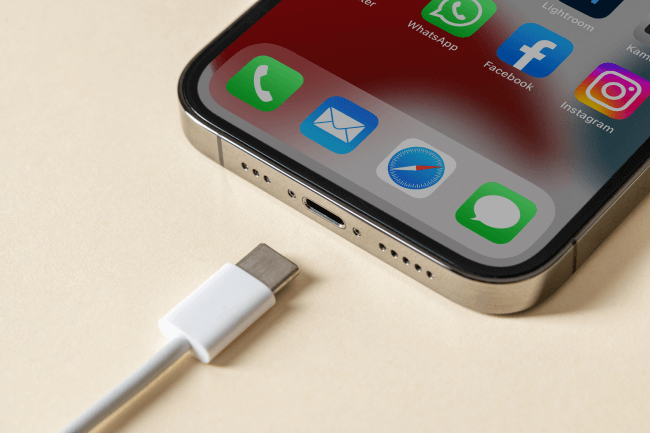Apple vs EU: The Battle Over USB-C Standards & E-Waste Reduction
In The News | 03-03-2023 | By Robin Mitchell
When it was announced that Apple had no choice but to switch to USB-C, many cheered as the future of standardised hardware inched closer to reality, conforming to the EU's new legislation requiring all consumer charging devices to use USB-C. However, a new leak from inside Apple has revealed that while the new iPhone will use USB-C, it will require a specialised MFi cable for proper operation, raising questions about Apple's compatibility and charging standards. Why has Apple hated the inclusion of USB-C as a standard, what has the new leak suggested, and could Apple get away with such a plan?
Why has Apple hated the inclusion of USB-C as a standard?
When it comes to USB cables, it is almost universally agreed that USB-C is by far one of the best. To start, USB-C entirely eliminates the USB superposition phenomenon whereby it takes three attempts to insert a USB connector (thanks to its ability to be inserted in any orientation). Secondly, USB-C connectors have multiple channels and can support USB 3.0 speeds (expected to exceed 40Gbps), and thirdly, USB-C connectors can support much higher charging currents. But above all else, it seems that USB-C will likely become the universal connector for all devices, and this will massively help reduce e-waste while only requiring users to have one cable type for data and charging.
As the rest of the industry rapidly moves towards USB-C, Apple has been notably resistant to its use. Sure, the latest iPad utilises a USB-C connector, and several of their MacBooks use USB-C as well, but Apple still produces consumer devices with their own proprietary connectors. But recently, the EU introduced new legislation requiring all consumer charging devices to use USB-C, and Apple was not happy with this decision.
According to Apple, forcing manufacturers to use USB-C stifles innovation, takes away design freedom, and hurts the overall capabilities of engineers. Now, while this argument may seem reasonable (as governments telling engineers how to do their job never ends well), it is more likely that Apple doesn’t want to use USB-C so it can retain control over its proprietary technologies, squeezing out money from anyone who wants to create compatible products.
It should be noted that the solutions that Apple have produced are exceptionally good; the lightning cable is also double-sided and can be inserted in any orientation like USB-C. However, as only Apple devices use the lightning port, it is very difficult for customers to use generic off-the-shelf cables with them. This is notably seen in cheap charging cables that often cannot provide quick charging or data capabilities. Thus, users are often forced to buy Apple cables that conform to their Made For iPad/iPhone (MFi) certification, which are extraordinarily expensive.

A new leak suggests Apple will circumvent USB-C requirements
Recently, a well-known leaker called ShrimpApplePro has released internal Apple information regarding the next generation of USB-C devices and how Apple will bend the rules to force users to purchase expensive cables. Despite the EU specifically stating that new USB-C devices need to support fast charging regardless of the cable used, Apple may only provide the bare minimum capabilities over standard USB-C cables while providing full capabilities when using Apple MFi-certified cables.
Whether the source of this information can be trusted is up for debate. However, the aforementioned user was correct with their leak on the Dynamic Island and the iPhone 14 RAM increase. Considering Apple’s history with custom cables, pricing practices, and resistance against right-to-repair, restricting capabilities over non-MFi cables would not come as a surprise. It should also be noted that other manufacturers routinely use their own cable standards, meaning Apple would not be alone in such a move.
Could Apple get away with this move?
According to the leaker, Apple will enforce this requirement via software to detect what type of cable is being used and effectively penalise those who opt for a third-party cable. Some online users have pointed out that if this software limitation is incorporated into Apple products, then it would violate EU law, citing that the purpose of forcing USB-C will prevent manufacturers from unfairly limiting charging speeds and data rates. However, it appears that the legislation states that it will “help prevent” as opposed to outlaw, meaning it could be perfectly legal.
With all things considered, if Apple does indeed go through with this plan, nothing will likely be done for a few years before the EU files a lawsuit. This will undoubtedly result in a fine, which Apple will fight to reduce and eventually pay after massive profits have been made. But, just like BatteryGate, Apple’s image could be tarnished by such a move, especially considering that the world is becoming more environmentally conscious.
All of this is speculation, and just because someone with credibility has supposedly leaked information internal to Apple doesn’t make any of this true. It is possible that one engineer internally to Apple mentioned how this could be done but never got passed the drawing board. It could also be disgruntled environmentalists looking to harm a successful business simply because they disagree with Apple’s repair policy.

